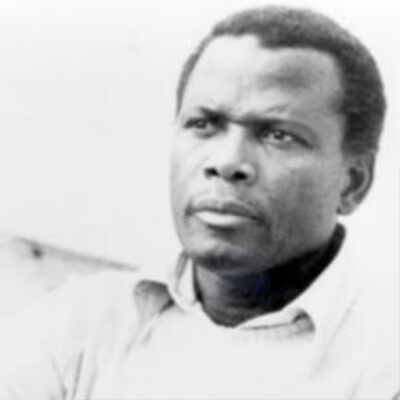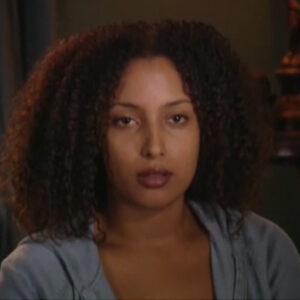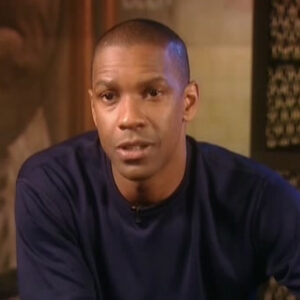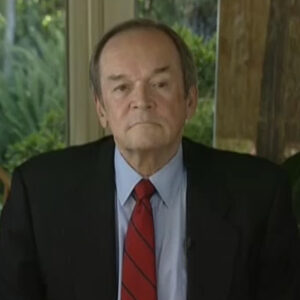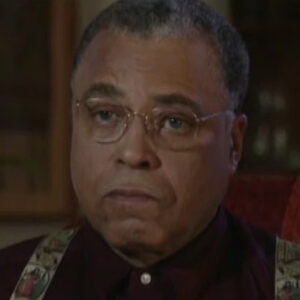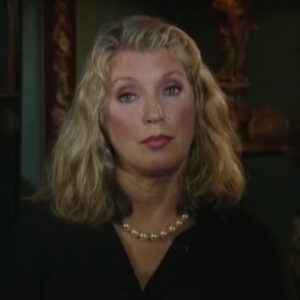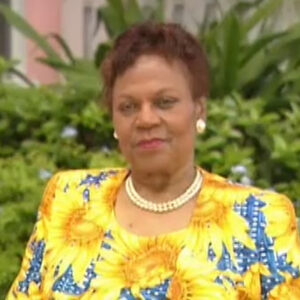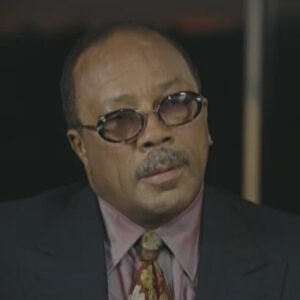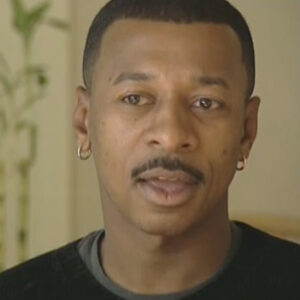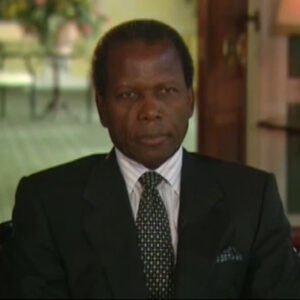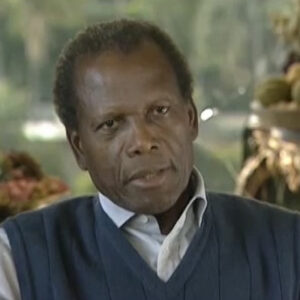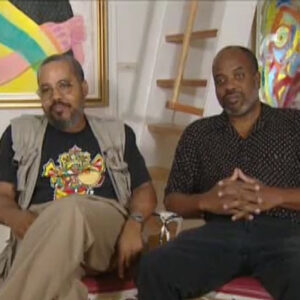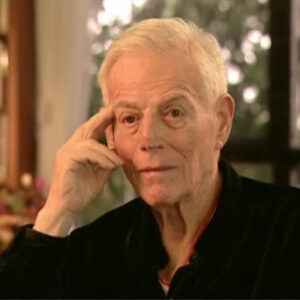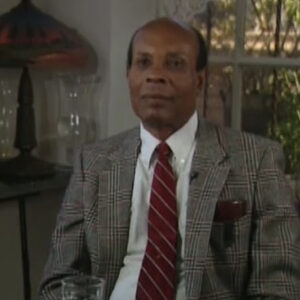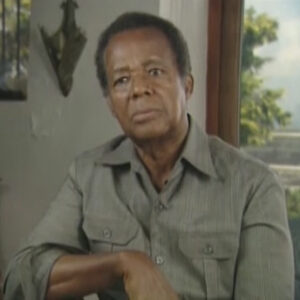Speaker So tell me, when it was that you first met Sydney, we first saw something.
Speaker It was, I think, around 1952 and he came to the apartment that I was living at the time with Doris, and he was brought in by a mutual acquaintance of ours, William Marshall, who was also an actor.
Speaker And these two extraordinarily handsome man walked in the door, barely able to get in the ceiling were about five feet, eight maybe. And these two guys were six feet four. And that’s when we met. And with the ground, we were having a meeting about a civil rights issue.
Speaker And he came to that meeting and we became friends. I was not at that point the producer you were. I was not. I was still singing.
Speaker The senior auteur there like that, yes, right, oh.
Speaker So how did you become friends after that?
Speaker Well, that evening we sort of hit it off and then occasionally we see each other and then we began going to the home. Then I was there. I was Sidney and Joanna at that point.
Speaker And what I wanted. I’m sorry. You’re right.
Speaker And again, I wanted to it was sitting and Juanita and they were living in the West Nineties in a small apartment in Sydney, had a little restaurant in Harlem called Ribs in the Rough. He had started a career and began to fade down somewhat.
Speaker And he started a restaurant and he was a cook and dishwasher. And Lenox Avenue, he cooked.
Speaker Oh yeah. Oh, did. For the. Yeah, and why did you start the restaurant, because there was a period when he was here.
Speaker Mike, my question. Oh, so do it for at a certain time after we met fairly shortly after he was not getting that many jobs, an actor and so opened a new restaurant on Lenox Avenue in Harlem. And he did all the work that could to wash the dishes and the restaurant, I think a capacity of about 12 people. But he managed to eke out a living because he had a couple of children. And we all seem to have a weekly poker game with all the unemployed black actors. And myself, who is not a black actor but was not employed, so I was able to get in and write and we played poker in the winter, could end up paying the rent conceivably in the loser, of course, would owe the money because none of us could afford to lose. But we got to know each other very well through different social activities and also our involvement in civil rights.
Speaker And that city was very variable.
Speaker Oh, yes. In terms of his point of view, certainly. I mean, I’m sorry. Certainly was in terms of his point of view about what was going on in the country and the black struggle. And of that he he did not try in any particular way to publicize his involvement as such. But he was always there. It was never enough.
Speaker One of Australia’s and our relationship just kept going. And then we both began to know Lorraine Hansberry at one point in our lives. I through meeting her as a singer when she worked as a waitress and Sydney, we just, you know, had the same circle of friends. And when Lorraine was trying to write at one point we had a meeting at her house just socially. And she was asking him for advice about what to write about. She was trying to write about things that might be commercial. So she was writing about these four white girls who lived in Greenwich Village. And of course, she wasn’t selling anything. And she asked Sidney, what can I do?
Speaker So he was working in television. And I was doing this in the 1950s, about 54, 55. And he said, well, first thing you got to understand, that’s what you have to do first. You can’t write about the black community because nobody can buy be to put it on television. But he said that’s what I’ve been trying to do.
Speaker And he said I started writing a play for television about these two white guys. And they’re having a discussion one day. And one of the white guys says to the other white guy, Hey, Joe, what if white folks treat us so badly?
Speaker And he said, So you’ll find you’ll have difficulty trying to write anything that’s really good, whether you really feel strongly about because who you are will get into the picture. So in other words, he was saying to her, you know, you got to do what you can do, what you feel and all of that. And he was a great help in terms of her point of view, writing about what you know.
Speaker Exactly, except what and.
Speaker Well, the I remember going to a play that was done in the village about a black family with Lorraine, which got to the theatre a lot to hold me off off off Broadway things. And she didn’t like the play. And she said, well, if I can write about that kind of thing, I could write about playing that. And I said I was not a producer at that time. We would just try it. Maybe something will happen. And about a year and a half later, she showed me what was the first draft of Raisin in the Sun. And I had heard Sidney come up to my apartment to listen to her read the play without telling him who wrote the play.
Speaker And he was impressed by it. She didn’t have an ending, it was really a first draft, and then he began to guess who might have written it with Martha Childress, was it? I do remember some of the other names like Black Writing. And finally I said, no, it’s Lorraine who had read the whole platform. She did play reading and he couldn’t quite believe it. And that was the beginning of that particular part of the relationship and your relationship and my relationship in that area. And he promised me a few weeks later, if I ever got the money, he would do the play.
Speaker Now, that took about three years, three years for you to get the money. And in that interim period, he became a much more important star than he had been. But and his agent at the time was not that happy about his doing a play with Marty. Yes, but certainly had promised me we didn’t have a contract. And so when I was ready, there he was. I like to tell one story about the day he made the promise to me. I happened to be home in bed. He come to visit me. I had the flu.
Speaker And that’s when he promised me that if I got the money, he would do it and he used to tell him, I think what you were thinking is that I would never get over the sentence and he wouldn’t have to live up to your promise.
Speaker But he did.
Speaker Was this before or after he made cry the beloved country?
Speaker I met him when he just got back, going backwards. Now, he was brought to my home when he had just gotten back from Africa.
Speaker Having done cry the beloved country, did he ever talk to you about that experience? And he had to be indentured to the director?
Speaker Oh, not that I didn’t get those kind of details at that time. Yeah, but I knew what he would be going through their indentured to that.
Speaker I didn’t know that in order to play it all.
Speaker The play opens March 11. Nineteen fifty nine. That’s right. And it was like nothing that anybody had seen before. What was its impact?
Speaker It was extraordinary in so many ways. First, I was a new producer. We had a young man named Lloyd Richards directing who had never done any directing in New York. Particularly he was teaching.
Speaker I had this young woman who was at the time when she wrote the place about 25. When we opened the place, she was 29. I couldn’t get a theater for the play.
Speaker And we actually went into rehearsal with that play and opened in New Haven and had two weeks in Philadelphia and we’re doing New York and we can have later. I still did not have a theater. But John Schubert at the time, Billy Sherbets came to Philadelphia and watched the crowds and he said, well, maybe I’ll give you a theater. And he gave us the band while we had to go to Chicago first because we had to fill in for weeks. So we did that and I came back. We had two nights in New York. I get this call that I’m in right now. We opened played one preview on March the 10th, and that night, Sweet Bird of Youth opened in New York at the Martin Beck and we believe you got all rave notices.
Speaker We’re opening the next night. And during the performance, Lorraine and I sat in the back and watched an audience that was rather non-committal, to put it mildly. They didn’t know much about the play. They were preview audience. And Lorraine said to me, well, I guess things are different in other towns. Looks like it’s a flop. My press agent at the time took me to a bar next door at the end of the second act and said, this is what we have to do. We have to close it down and I’ll try to get Kazan to come in and take over. And we’ll have to do a lot of work on it because obviously this is not going to work. We were opening the next night. I didn’t have any money. There’s nothing that could even be considered if I wanted to. And I said to him, I don’t know what you’re talking about. We’ve had this play. It’s doing very well. What is all this about? I was inexperienced, obviously, and when we opened the next night and the audience response was absolutely incredible and they wouldn’t leave. And it was like a bad movie. They were yelling for the author. Oh, and even the critics who used to rush out of the theater after an opening because they had deadlines to meet in those days. They stood in the back and watched on this and Sydney leaped across off the stage, ran up the aisle and always carried Lorrain onto that stage. And you know what that scene must have been like.
Speaker It was just wonderful and he on stage one of the tragedies of the word to you, but the fact that Sydney, along with people like Brando cetera, that we’ve never seen him again on stage, the way he moved on stage, I know you say to a degree in a film that if you can imagine him, there was a moment when he rushes across the stage to greet the college student, though he’s going to attack him. And it was a tiger up there. It was just an extraordinary.
Speaker What what were rehearsals like? I know that he had a lot of problems with a mother being as strong as she was talk about.
Speaker Well, he had the problems.
Speaker And to her credit, Lorraine had foreseen that and she herself was frightened of that. She was writing a play. She was concerned about waterlily, younger. But she wrote the part of the mother.
Speaker And I’m not using the word pejoratively, but she was a stereotype of what a wonderful black woman, head of a family would be, nothing negative about it. But, you know, the audience is going to fall in love with her. And it was waterlily, there was supposed to be feeling things for we all knew that, in fact, these the curtain on a second act when she almost beat up on him.
Speaker She hated watching that moment because she knew the audience was so much going with her as a mother rather than with a mother rather than what a lever to Sydney’s character. But there was nothing really. We tried some things and Sydney asked for some things, tried them occasionally. But you can never get anything that was better in any way. And it stayed to a great degree, the same. But to his credit, what Sydney did once he, I think, sort of accepted that that was going to be he began to really work on that part in Chicago in those three or four weeks time. We brought that to New York.
Speaker There was no question that the play was about and he was incredible and probably and probably the strength of Claudia McNeil in it was the thing that that he needed to fight against that set up.
Speaker That whole that maybe that certainly helped, but there was no question that he was going to have it by the time we reached him in the best sense of the word. But it was it was a good acting struggle. Yeah. It was wonderful to watch.
Speaker And so he and Lorraine made up and.
Speaker Oh, yes, yes, yes. They made up. I mean, you’ve been through the show a few times with writers. And it is she was also a very, very strong individual. I mean, she hated the part of beneath it in the play. That’s the daughter, Sydney sister. And she hated it because the audience would laugh at things that she said, which were very funny. But Lorraine didn’t want to be laughed at. Lorraine was beneath her. So there were portions of the play there that she disliked.
Speaker But it was they were all wonderful characters, and you did the movie.
Speaker Yes. Worked on a movie. How did how did that come about?
Speaker I mean, this was such an amazing career move for you had nothing to do with it.
Speaker Well, it really had very little. I had very little input to begin with of getting that position. What happened to the David Suskin at the time? You know, he was who had the program on TV.
Speaker And I just signed a deal with Columbia Pictures to do three films. And he got the rights to the film through Columbia. Incidentally, he turned down producing the play with me because he thought it wasn’t commercial. But I knew him through Sidney. But then he bought these rights and went to Lorraine. I mean, the attorneys went to the man’s attorney and she said, fine, I’ll sell it. Celebrators has to be the coproducer. I not going to do that. I didn’t know anything about it. And they said, come on. He said he knows nothing about producing films. She said he knew nothing about producing plays either. And they resisted for a while. And then she just told them, just forget it, you know, doesn’t have to be made. And that’s how I got there.
Speaker Amazing. And who directed it? And Dan Petrie, who David had known.
Speaker David worked for David Susskind and TV and television.
Speaker But in talking about Sidney, if I may leave the theater aspect for a moment. In many ways, he’s the best friend I’ve ever had. I don’t know if I was best friend, but he’s certainly the best friend I’ve ever had. Things you’ve done with me for me, which I don’t need to talk about. But it is also true that anybody he knew in his life when he was starting out before he was an actor, he maintained his relationship with through the years when he would come to New York, he would call those people. To this day, many of them are no longer alive.
Speaker And he never gave up those relationships and if anybody needed help.
Speaker I’m not sure you should be defending me, hit me for it if anybody needed help at any time he was there, anything that that’s never changed and you wouldn’t know, you might not hear from him for two months and suddenly the phone would ring and he’d say, OK, how are you doing? Is she getting any? Because everything all right? And that would be that conversation sometimes.
Speaker And it could come from anywhere. It could be in London. Make the call. And I know that it would not only have to deal with many, many people and people who do not become important in the industry of the world or anything like that, just people. That sense, I I don’t know if I’ve ever met quite quite like him.
Speaker That’s about the best thing that one can say about another person.
Speaker It is this the whole period. I don’t know if you’ve covered this.
Speaker And all talking about it when there were articles written about him and I’m sorry, the Mason Clifford, Clifford Mason Clifford Mason wrote that article in The Sunday Times. In The Times. Yeah. Talk about that.
Speaker I saw what happened to this country and how much of it I mean, improvement, how much of it was due to Sidney Poitier. I know who he became. I would go out with Sidney in the early 50s and you could be in a restaurant with him and some people might recognize him. But to most of them, he was just another black man and they would never think of coming over to him. And the image that he created in his films, the very thing he was criticized for, first of all, there was no understanding on the part of the people who do the criticism that without that image, he’d have done one movie or two and that would have been the end of him. They were not anxious to create stars. They were not anxious for Sidney Poitier to become the number one box office attraction in this country. So he ended up playing these wonderful, wonderful human beings a great deal of the time and in the struggle, some in the black community and some of the white critics who said, well, why is he always so wonderful? And things of that kind. But I watched just literally walking down a street with him at times, the change over the course of one, two or three years. And I began to see these white ladies coming over to the restaurant and asking for an autograph for their daughter, the mere idea of their doing something like that for their daughters. You saw the change in how much of that change he created. I mean, the phrase black is beautiful, which became a phrase of the time. He was almost the personification of that phrase.
Speaker I’ll tell you a little negative part of the story when I was filming, this is something he wanted when I was working on the film A Raisin in the Sun, and I was assigned a secretary in California from the secretarial pool. And one day Bellafante came up to the office just to say hello to me because he had been on the set to see Sidney and the secretary of the young white woman, about 25 years old.
Speaker I thought she was going to have an orgasm in my office.
Speaker While Harry was there and then Harry left and I said to her, because Sydney had been at the office, obviously I was surprised that your reaction to Mr Belafonte.
Speaker I said, oh, he’s so beautiful.
Speaker I said, you never comment, and I’m right here, and she looked at me and said, Oh, he’s a black. And again, out of 1952, 52 or three, we made the film and I watched him do to the masses of people in this country. Literally change their attitude towards black people so that when I first read them, I would get so angry at those things and there was a series of them that were written well, that was around the Black Panther Time, too.
Speaker Yes. Yes, it was the early 60s. It was, you know, kill Whitey. And they had the same feeling about Martin Luther King also that he was passé, that he was irrelevant.
Speaker Yeah, that part was true. But they say just that on a personal level, what he accomplished with the white people in this country was extraordinary and very important. And he ended up being I’m sure he didn’t want to be called that, but he became a symbol of how the country had to move. And it’s it’s there to this day now, because when I was doing a play and Eddie Murphy came to see the play. And of course, people in the audience noticed him and maybe three or four people came over and asked for an autograph and Sydney came to a matinee and we couldn’t get the second act started. Not only did everybody want to talk to him and see him, but they suddenly felt they could. He was part of a family, they could approach him. And I think that’s that’s something that’s so underrated and understated what it meant. People tend to look at how activity politically, how it affects that he was active in his way and where he did it. And he did it privately most of the time. But what he actually did for this country is its amazing.
Speaker And there were black actors who were at this tribute to him, Robert Townsend and others who said that when they were younger and sitting in movie theaters all over the small towns that they came from, that it was the first inkling that they had of the fact that they, too, might enter this world.
Speaker Lee, I was producing at that time, No one play after another. And I did a number of black plays, as they were called. And so many, many young black actors, black actors came to see me. And without exception, at one point or another in the conversation, I would say, if not for Sidney Poitier, I would never become an actor, one after the other, after the other. Its impact has been obviously, it’s not looked upon as a political impact, as a Martin Luther King, et cetera, and deservedly so, but I know through seeing it happen personally, the kind of impact you have in this country. I don’t know who else I can name that have accomplished that.
Speaker Was there a difference between Sydney and the characters that he played? Were they too perfect?
Speaker Well, let’s let’s start at the beginning in terms of my relationship.
Speaker There was nothing perfect about what the younger no matter of fact, I tried to get Roger Stevens to invest in the play and he turned me down because he said, no, that’s I thought, I don’t like that man.
Speaker Well, and so he is the reason he played a very complex, you know, character he did in a few others.
Speaker Now, as it happens.
Speaker After a certain period of time, the ones that became so big that the defiant ones, guess who’s coming to dinner, I certainly wasn’t playing that that icon in the defiant one criminal, presumably heat of the night and then, of course, in the heat of the night. He was also a complex character, but wonderful. You could love him or not have to work. He was the hero, obviously, of the piece.
Speaker He was a black cop in the south. That’s a great place to play.
Speaker Of course. Of course. And watching him with you, I just saw that again the other night because I always have trouble resisting it when it comes on.
Speaker And the scenes with you were just so wonderful.
Speaker That moment when he tells you. What he does. Like this, yeah.
Speaker Yeah, I was fortunate having him in that play and watching him work on a stage which he was fortunate to.
Speaker It was I think it was the part of his lifetime, you know, his complexity, his raisin in the sun and edge of the city for me kind of personified that youth that he had and this tremendous, you know. Ducked through which he could express the passion and the anger, envy and the fun and the fun, you know.
Speaker Yes, he was so much fun. He was he was an next to live. And he was what? He was an image of the city. There was a woman I knew a woman of about at that time in her 70s who told me after seeing it, she was watching it. And she said, I started to say during the movie, no, he mustn’t die. I don’t want him to die. I don’t want to die.
Speaker And when it happened, he she just was destroyed by it. And again, this is a white lady. I was watching the movie about this black man. He did it, he did it to the people. He brought them into a new relationship, which they began to accept.
Speaker Yeah, you could not help caring about this. That’s right.
Speaker That’s an interesting thing. You bring up that I was in the box office of racism one day and the play had been on for about 15 minutes, ten minutes maybe.
Speaker And a man came out of the theater and we were selling out at that point and he said, I’d like to change my seat, went up to the box office and I was at a broken watch, which all had no, no. I just want to change my seat. He said we don’t have any seat to put you in. He said, Where can I stand in the back seat?
Speaker OK, go on, stay in the back. And I ask the box office man who looked the seat. It was a fourth row, you know, wonderful, wonderful seat, probably bought from a booking agent. And I went down the aisle to see where he was sitting and he was sitting between two black people and he had a Southern accent.
Speaker He would not sit there for the show, but he didn’t leave who was there at the end of the show.
Speaker So, you know, Sydney, and again, this is just I’m saying the obvious, without Sydney, there would have been no reason to say I had a tough enough time getting it on with him, but there was no way in the world I would have seen the light of day, not in that time.
Speaker What is this about shooting the film version of Raisin in the suburbs of Chicago? What happened at the house with the family that they were threatening? Phone call?
Speaker What happened? Yes, we had gotten this location in Chicago. I think we intended to be there for a couple of days or something.
Speaker And the the lady, the house, the young mother was pregnant and she lived there with her husband and also her mother.
Speaker And of course, it had been all over town that we were coming to do this baby on television, on radio with all the newspapers. So everybody in the city knew we would come down and shoot a movie.
Speaker We’d been there about three hours with all the trucks outside and everything going on. And phone calls began to come in to this household of people threatening to blow it up to do this because a black family was going to move into this neighborhood. This with the movie Being Life and the Life Being movie and back and forth, and she finally got hysterical, the the pregnant lady and her husband came to us and said, you’ve got to cut it short and you’ve got to get out of here, I’m afraid what’s going to happen to you?
Speaker So we did we did much less of that than we thought we were going to do.
Speaker And the interesting thing about it was the grandmother, the mother’s mother, was angry at her daughter for giving in. We were in a suburb of Chicago, obviously.
Speaker Was it a black family? No, no.
Speaker We were in a white neighborhood that we were filming it where the family movie with both to move into the white family, but all the white people from surrounding areas were calling up and threatening.
Speaker Because a black female was going to move in the neighborhood, we were doing a movie, but it’s not that different today, unfortunately, is very often not that different.
Speaker Um.
Speaker I also heard that that the cast had difficulty finding people who would rent to them in Los Angeles when they were doing the film and that Sydney called a press conference to expose that fact.
Speaker Do you remember this? I remember that vaguely. I don’t remember that specifically. But, you know, there are always problems, always problems.
Speaker Where you spoke about this in Sydney, remember his old friends after he became a success? Did you ever visit him in the Bahamas?
Speaker Oh, yes. Yes, more than a couple of times now.
Speaker There are a number of times where his house and Nassau and also he got us into the Ocean Club one time for vacation.
Speaker I’ll tell you something else that he did, I had a secretary in New York, a young woman who came to work for me when she was about 17 years old and worked for me for 38 years. And she was so very religious, Catholic family.
Speaker And she was a young black woman who to some degree was passing.
Speaker She was very, very light skinned. We never talked about it, but she had no relationship with black people should be raised that way. One of her sisters was a nun, and Sidney used to come up and tease her and she would blush. And then one day she was talking about where she was going to go on vacation.
Speaker She mentioned she had nowhere to go. And he said, Why don’t you go now? So I introduce you to some people. So she thought about and thought about, said, I’d like to go. So of course he did. And she met her family and met a boyfriend and came back having had this wonderful time.
Speaker And this a black man from Nassau visited her in New York a couple of times. And from that time of her life talking about influence he had, this lady became one of the most active militant feminist civil rights person.
Speaker I just watched her do a complete change of who she was.
Speaker And again, now, obviously in my office, there were many black people coming in and out that she was exposed to them.
Speaker But he did that that very specific thing, and she had this wonderful time.
Speaker What did you find yourself that when you went to Nassau, you had certain revelations about Sidney knowing where he came from, that you could see other Sidneys there in a certain way?
Speaker I don’t know if I could quite see it that way, because knowing him as well as I did by then, almost nothing was a real revelation.
Speaker I mean, I knew how he was looked upon there, obviously, but I watched it also happen here. So but I knew of the impact he was having on young black men. I mean, that that was obvious anywhere.
Speaker But I felt that that the fact that he came from a place where there was a 90 percent black population gave him a kind of stability and a self actualization that that gave him a kind of start in life.
Speaker Well, it’s interesting you say that because I had a discussion of something of that with him just a few weeks ago, because I I’ve always marveled at what he did when he came here or even why he came here, as you say, from the black country, quote, and decided he wanted to be an actor. And I said, how how is it even possible? We talked about that.
Speaker But there’s something in him that I can’t quite explain.
Speaker And maybe you have some some reading of it that he was able to overcome coming here, speaking with a heavy West Indian accent and walking into the theater in Harlem.
Speaker And I’m sure you know that that whole story and saying, I’m going to do that, how could he possibly have had that inside of him to have that kind of confidence? And maybe what you’re talking about has a great deal to do with it. But I don’t know. I have I visualize it and I know the place that he lived in. I know the turf restaurant where he worked as a dishwasher, where I used to hang out when I was in the music business.
Speaker And I almost can’t visualize how he began, and yet it is the story is so Dickensian, you know, but it’s not I mean, he he came from a place where there was a taken for granted that you just moved ahead and got ahead and also did a lot of dancing, you know what I mean? Yeah. Tell me about the project that you were recently involved together. You shouldn’t have.
Speaker That’s that’s almost like a complete thing of two book ends with him without him. As I just said a few minutes ago, there would have been no raisin in the sun, no vagueness. It would have been written, but I would have been expelled except as the main one that will do it in some little church somewhere.
Speaker And I got a call, you got Labor Day after the Labor Day weekend, there was a call on my machine that Sydney had called and Bill Greeves to try to get me to go see this showcase of a play by play call. You shouldn’t have told. And I was away. So they went.
Speaker And then Sidney left this message for me. And the message was very specifically, I wanted to go see this play. I don’t want you to leave in the first 10 minutes.
Speaker If I’m a terrorist, there’s that. But there’s a talented writer there and she needs help.
Speaker That’s the message I got on a Monday evening at the end of the Labor Day. I was there Wednesday night. I began to talk to this lady and without going into too much, it’s an extraordinary story that she’s a woman in her 50s, never written before. And she worked for David Dinkins for a while and then came out of that and decided to try to write her what she had to say. So he got me there to see this play. And I began to talk to this lady. And then we close the play down for a month. I did some work on it, some emailing, some casting, and the play just celebrated its first year and 40 seconds to play. It arises. And we’ve been running our 300 performances. And Sidney came to see it twice and talked to her. And of course, the day he first walked in there, you know what happened to her? And it’s, again, fascinating to me that here I am again and I was not producing anymore. And suddenly I’ve become the executive producer of this just to try to get it to where it is now.
Speaker And it’s Sidney and that wild great. I’m nine.
Speaker I mean, I’m 52, but Republicans and fifty nine thousand ninety eight. I’m involved again in a show about a black family with the problem, the problem with child abuse.
Speaker But it’s Sydney, it’s it’s lovely, it brought the roses to your cheek. Thank you.
Speaker What else would you like to say? Because I’m finished with my questions.
Speaker Well, first, I’d like to say that when he sees this, he’ll still be a friend of mine and really that I thank you for the opportunity to say some things that I have not had a chance to say about him.
Speaker And my feelings about.
Speaker Because we and my wife, you know, Doris, Doris, Bellac, we have marveled at him so much. What he’s done on the screen, of course, but his relationships with people.
Speaker We talk about it all the time, and it’s just a part of him and I guess in some ways the most important part of him, and I guess you would say it comes through in the acting, I guess.
Speaker Thank you. All right. I hope so. Lovely. Thank you. So lovely. I hope the voice today you can get in the way too much.
Speaker Because and and I know the writer of the play, yeah, run a TV show out there with Lee Leonard to promote the play and of course, I talked about Sidney.
Speaker He doesn’t know this, I’m sure. How did you do as a film and the film, I guess the definitive way I could say it to you, it wasn’t happening. I remember attending a meeting at Columbia Pictures, the first advertising meeting.
Speaker Now, that made this film, I didn’t quite know what to do about it.
Speaker And one of the people I must have been 10, 12 advertising people got up and said, well, this is our problem.
Speaker We’ve got to get the white audience to come see this film.
Speaker And the only way we’re going to do it is by not really letting them know in advance. It’s about Negroes.
Speaker This is after the plane had been running for a year and a half and the movie had been made and that was a serious remark we made that should give you some idea of how badly they handled the film. The film had become a classic film to a degree as the result of television.
Speaker So people have seen it, but it had not become a hit at the time. Because they didn’t they didn’t they didn’t sell it, they didn’t really know how to sell it.
Speaker It can’t be a film about me.
Speaker I mean, that’s the point. You know, who will who will come see it like that with told me for two or three years, and I was trying to get the play on even people who would compliment me and say, that’s wonderful, you’re going to do this play. But of course, nobody will come.
Speaker It was amazing, this amazing, amazing, the one of the papers in Washington will be sent out a road company to have this at home, had a sister in law at that time who moved out of the area she lived in because there was a rumor that some white family was going to sell to a black family up the street. Now, I’ve already done this play my sister in law. And I was just and there was a time when the whites were beginning to flee from their areas. And one of the Washington papers, in addition to their review, had an editorial about it in the scene. When Waterlily finally says at the end, we’re going to move into this neighborhood because my father owned it, we have a right, the entire audience, which is practically all white in Washington at that time. Applauded the speech, interrupted the show to applaud the speech, and the editorial said it’s a peculiar thing, the very people who are going to go to their neighborhood and fight to keep the Negroes out. And here they are. So it was the testimony of the kind of testimony to the play that for that moment in time, at least, they could think a little bit differently.
Speaker Yeah. And that he could pull them out of that place? Well, that was not Sydney, which is why the fact that he didn’t do the road company. Huh? That’s the character that did that character.
Speaker Do you want to do his hands? Tell me, did you get any those clues, huh? Let’s do it. Yeah. Assessment’s. You what should I ask for? Do you want to ask the question of why Sydney was? Why?
Speaker What was we’ve talked with Bill Greaves, who was a young actor at that time.
Speaker There were many wonderful young actors then. Why Sydney rather than them?
Speaker Well, I guess in so many of these things that are coming together of certain circumstances, when you’re talking subjective man, oh, of certain circumstances now, they had this movie to make Richard Widmark within it, right?
Speaker Right. But with no agenda, no way out. And I know there’s so many people and obviously they were searching for somebody who would be able to do and say those things on the screen and the audience would go with him because they certainly knew what they were facing in this country and they didn’t even have the advantage of thinking, well, at least a little tact will attract the black audience because that wasn’t happening in those days. And you were doing an all black then or something. So they were searching. And I guess the only thing I could respond to who I knew, all the black actors of played poker with them and they were all struggling. And I think the only thing I can visualize, it’s something in that persona and the look made them feel that he might be able to overcome it. Who are the people who were involved who had that? Well, no, I talk about that. I just said he was originally on TV. I didn’t realize that on either outside of the city. No way out. I’m confused about to enter the city with television originally, but in no way out.
Speaker They made the choice, I guess, because of what we all know about them now, the way he looked and the fact you could just relate to him this way and perhaps perhaps at that time not feel threatened, which would have been very important to them making the film.

